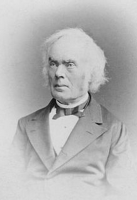










Alfred Wilhelm Volkmann (1801 – 1877) was a German physiologist, anatomist, and philosopher. He specialized in the study of the nervous and optic systems.
Studies and his Career
Alfred Wilhelm Volkmann studied in Leipzig from 1821 and obtained his doctorate in 1826, subsequently making scientific journeys to London and Paris. He was habilitated as Privatdozent at the University of Leipzig in 1828, becoming professor extraordinary of zootomy there in 1834, and in 1837 accepted an invitation to Dorpat as professor of physiology, pathology, and semiotics. He left Dorpat already in 1843, moving to the chair of physiology at the Friedrichs-Universität in Halle, where he remained active as a teacher and researcher until his death in 1877. In 1854 he also assumed the teaching of anatomy, until 1872, when physiology was branched off and given to J. Bernstein. After his fiftieth doctoral jubilee in 1872 Volkmann retired completely from his university activities.
In 1842, Volkmann and Friedrich Heinrich Bidder (1810-1894) showed the sympathetic nervous system to consist largely of small, medullated fibres originating from the sympathetic and spinal ganglia.
Alfred Wilhelm Volkmann was considered one of the foremost physiologists of his time.
His son, Richard von Volkmann, became a distinguished surgeon.